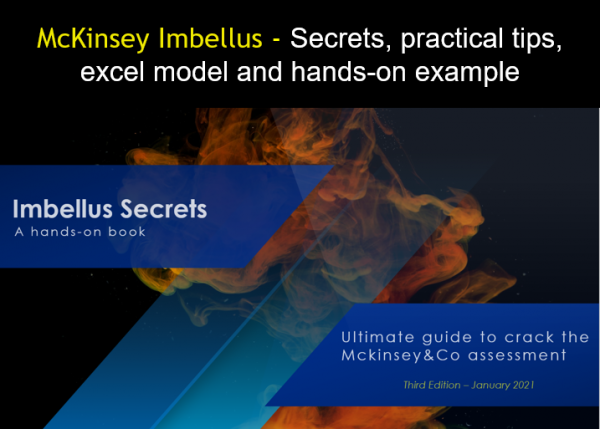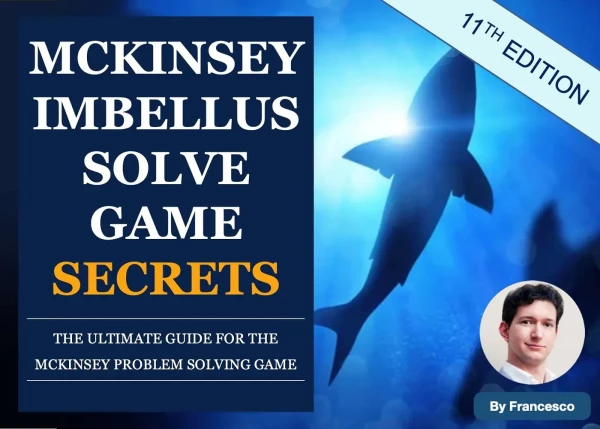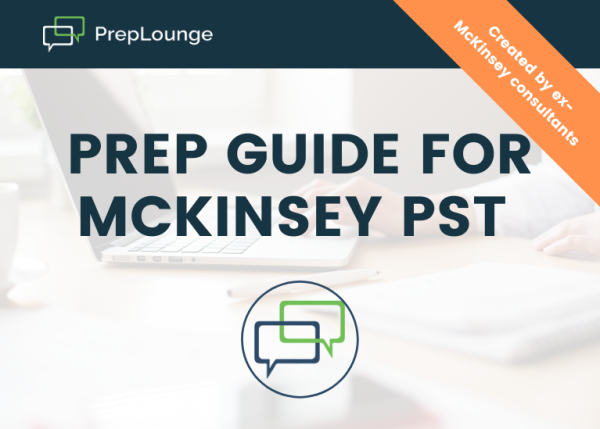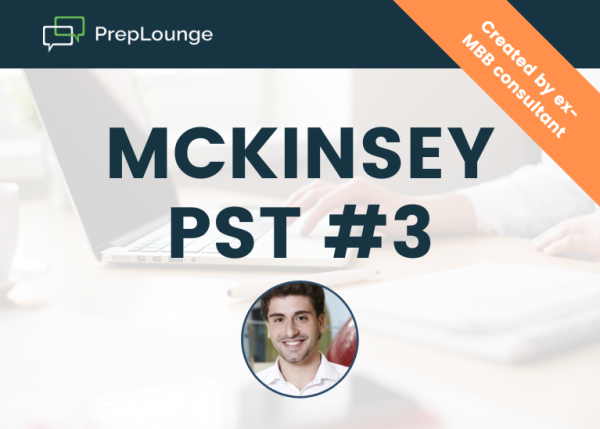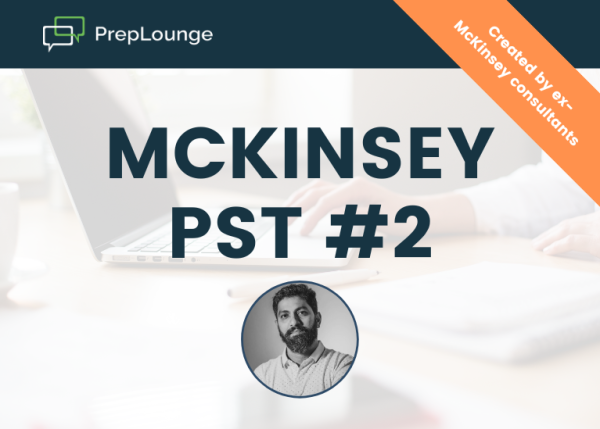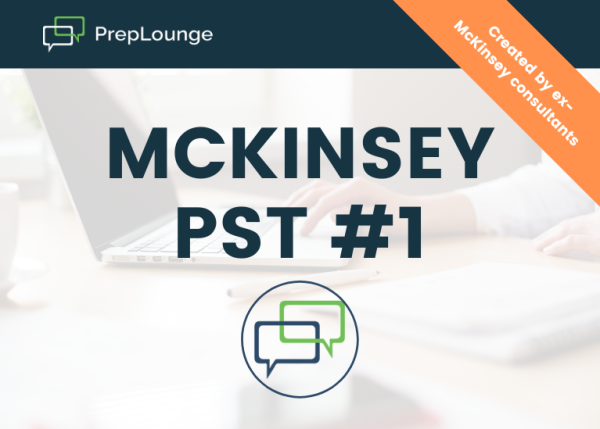Hi everybody!
Can you please share your experience or knowledge about first round interview at McK? I am applying for fast track internship. What should I pay additional attention to on case interview part and PEI part?
Thanks
Hi everybody!
Can you please share your experience or knowledge about first round interview at McK? I am applying for fast track internship. What should I pay additional attention to on case interview part and PEI part?
Thanks
Hi there!
I have done couple of interviews with McKinsey and happy to share my experiences with you. It’s typically an hour long interview divided into three sections:
Below are my experiences and suggestions for the three sections:
1. PEI: In all my interviews with McKinsey, the PEI section took on average 20 minutes. That said the length of this section can vary depending how interesting, engaging and structured your answers are. More often than not you’ll be asked the following three questions: (i) Tell me about yourself (ii) Why Consulting & McKinsey (iii) Wild-card questions such ‘Define Leadership?’, ‘Where do you see yourself in 5 years?’, ‘Have you ever failed at anything?’ and etc. The first two questions are quite straight forward but, keep in mind they need to be punchy, structured (e.g. three reasons why I want to be a consultant at McKinsey are…) and concise (not more than 2 minutes each). Regarding the wild-card questions, you should ask your interviewer for a moment to structure your thoughts. A good way to structure your thoughts and answer the question is to use the S.T.A.R. method i.e. clearly state the Situation, describe the Task(s), elaborate on the Action(s) you took and finally list the Result(s).
2. Interviewer-led Case Study: This section usually takes 25-30 minutes. The interviewer will walk you through a business situation and will give you some information and facts about the situation and the company. You’ll then be asked 3-4 follow-up questions. That said, view the case in the following manner:
3. Questions for the Interviewer: Here you can ask standard question to the interviewer such as ‘Why did you choose consulting?’, ‘What is your typical day at work?’ and etc. These are all good questions but, you should go an extra mile and research McKinsey’s though pieces (sign up to McKinsey Insights newsletter), look up your interviewer’s LinkedIn profile and google her recent work, and read up on global and regional economic trends.
Final thoughts, always take a moment to gather and structure your thoughts no matter how easy the case may seem. And, while solving your case think out loud and engage your interviewer. Lastly, smile often and don't be shy to admit your mistake or ask for help (limit it to once or twice!).
Hi Anonymous,
A good preparation for a consulting interview will likely move through the following areas:
As for the preparation, you may want to follow the usual steps for case interviews, preparing on:
As for the McKinsey interview per se, I have recently replied in another post with some information on the first round, you can find the answer at the below link:
https://www.preplounge.com/en/consulting-forum/mck-first-round-interview-336
Hope this helps,
Francesco
Hi Anonymous,
the first round at McKinsey in my experience is pretty standardized. You will normally always cover the following:
The case is interviewer led, which means the interviewer will have to cover certain areas, whether you manage to find an answer or not. If you are unable to find an answer, they will move to the next question anyway.
The areas usually covered are:
They would also consider how you would present yourself and soft skills: your body language, your communication and your reaction when put under pressure.
As for the areas to pay attention to, you may want to focus on the following:
Finally, some areas usually underestimated by candidates are
Each of the previous sections has of course its own elements and way to be presented in an optimal way. Please let me know if you would need more details on one of them.
Best,
Francesco
McKinsey Interview Experience
I interviewed for McKinsey’s first round at their San Francisco office, for an Automotive and Aerospace Implementation position.
The position is part of a relatively new but growing (fastest growing group within McKinsey) Implementation group which focuses on actually implementing the solutions that the strategy team develops. They are typically looking for people with experience managing others and implementing change in industrial, engineering, manufacturing and other similar environments… they tendto have a little more experience, and that experience tends to be more hands-on, than the typical MBB consultant.
That said, the interview process is effectively the same. As others have posted, after the 30 minute phone interview (which no one on this site should tress about), I was invited to a first-round interview with the Implementation practice. My interview consisted of 2 hour long interviews, the first of which was with an Engagement Manager and the second of which was with a Principal who had about a year on the team. The principal had a similar background to me (aerospace, big defense contractor); while the manager’s background was different (forget what it was). Both happened to be on-site, and both were in the Implementation practice, though you shouldn’t assume this will be the case.
In both cases there was a short discussion followed by 25 minutes of fit and 25 minutes of case. The cases were relatively straightforward, and the fit questions were straight out of the well-known McKinsey playbook (impact; difficult situation, leadership, etc).
Case-wise: One was about the economics of a newly developed product for a truck, which reduced air resistance and thus improved gas mileage, such as how much value it created and how to price it. Questions included the typical “how would you go about the problem” starter, to determine how much value it might create, what kind of issues the producer of the product might face when selling it, and ultimately how to price it and justify it. The second was about a company with 3 food production facilities, two in Turkey and one in SE Asia, which had different processes. There was some sort of global feed shortage, which impacted one site and not the others, so you had to figure out the impact and several solutions.
I wasn’t given a ton of detailed feedback, though I was told that my synthesis wasn’t good enough. I’d also advise that while you make sure you occasionally smile, ensure that you keep your demeanor very professional and serious throughout. I have a tendency to try to connect with interviewers with humor and while in some firms it is acceptable (/probably a good idea), I don’t think it helped me at McKinsey. Specifically, coming out of the interview I felt I connected very well with the Principle (based on background, and he was closer to my age and he seemed more easy going and my style during), but my feedback was that the Engagement Manager (who I felt I didn’t connect with at all) was higher on me than the principle was. But part of that can probably be chalked up to simple interview-to-interview variability.
The implementation practice had appealed to me because I have a lot of hands-on experience, a technical/engineering background, and have implemented change at big organizations. That said, in retrospect, I might recommend that you pursue the more standard generalist positions at McKinsey if you don’t have experience managing production lines, being responsible for a major supply chain, managed an engineering/product team or something along those lines. Having management experience isn’t a must for implementation, but its close.
If you have any other qeustions about the implementation practice, feel free to reach out
Ben
Hi Ben. May I know why one should not stress about the phone case interview? Is it any different to the 1st round interview?
(editiert)
Hi
My first round at McKinsey consists of two rounds with a partner each. Each
round consists of:
1. Fit questions are always first (sometimes partners have traveled a
lot before they interview you, thus they might seem slightly aloof,. Don't
get unsettled by this, its up to you to engage them and make them feel that
you are a great person to work with and can be put in front of client)
2. 35 minutes of case (1st round cases are pretty straightforward)
3. 5 minutes for your own questions to the interviewer (they are really
looking for honest, non-pretentious questions about McKinsey, so don’t go
with the mindset of trying to impress them with the questions, they don’t
like it)
The case is interviewer led, so you have to be pretty comprehensive in the
beginning when you are presenting your framework, you can’t really go back
to it from there, so make sure this first step is done correctly and covers
all the relevant points!
- Introduction: Explain to the interviewer, a brief summary of the case,
try not to do literally verbatim but ensure that you cover the essential
grounds
- Structure: here you should really think about the specific case and
not try to fit any framework just for the case, it’s very easy for them to
ding you JUST FROM THIS! Can explain why your framework/thinking would be
pertinent to this particular firm/industry
- Graph analysis: Flow: point out obvious parts, then explain what it
implies and what does this implication mean overall to the case objective
- Math: Talk through it slowly, get into the mentality of a math teacher
teaching a student
- Sum up: Practice those 30 seconds type conclusions to hone your
summarizing of conclusion into concise form.
They would also consider your body language and style of communication,
always present yourself as calm, composed (try not to be too loud or free
with the hand gestures) and PROFESSIONAL.
Hello, would you mind to give a update about the phone interview?
Thanks!
Hi Anonymous,
Many things already have been answered - for the McKinsey PEI part, PrepLounge recently published a specific guide on that. It's essentially an excerpt from my Ultimate McKinsey PEI Prep ebook, which you can find directly here on PrepLounge: https://www.preplounge.com/en/shop/tests-2/the-secret-mckinsey-pei-cheat-sheet-42.
It covers all important aspects to consider in your PEI, in how to best structure your PEI stories - in short, everything you need to know on that subject to succeed.
Hope that helps - if so, please be so kind and give it a thumbs-up with the green upvote button below!
Robert
Hi A,
Interview consists of 3 parts - FIT questions, case solving, your questions to the interviewers.
Both parts - FIT and case are equally important. So pay to them attention.
Since experts is nicely explained everything in details, I just want to add, that:
* reading books it's not your full preparation - so fin peers to practice it.
* excellent performance on the interview is not something inachievable - you just need to right a proper guidelines and experienced coach.
Wish you best of luck,
André
Hello!
On top of the insights already shared in the post, next week will be pusblished in PrepLounge´s Shop material related.
In concrete, the "Integrated FIT guide for MBB". It provides an end-to-end preparation for all three MBB interviews, tackling each firms particularities and combining key concepts review and a hands-on methodology. Following the book, the candidate will prepare his/her stories by practicing with over 50 real questions and leveraging special frameworks and worksheets that guide step-by-step, developed by the author and her experience as a Master in Management professor and coach. Finally, as further guidance, the guide encompasses over 20 examples from real candidates.
Here I leave you the link > https://www.preplounge.com/en/shop/tests-2/integrated-fit-guide-for-mbb-34
Feel free to PM me for disccount codes!
Hope you find it useful!
Best,
Clara
Thank you for your help. I am finding it incredibly difficult to organise myself over my notes at the moment as I'm being bombarded with infromation and there is a lot of overlap, expecially considering I only had about 2 weeks to beigin preperation and now 9 days left.
Das Influence Modell von McKinsey ist ein strategisches Werkzeug, das entwickelt wurde, um Veränderungsprozesse in Organisationen zu optimieren.
Erfahre, was genau das 7S-Framework von McKinsey ist und wie es Unternehmen dabei unterstützt, Stärken zu maximieren und Schwachstellen zu identifizieren.
Erfahre alles über das McKinsey Imbellus Game und wie du dich damit auf ein Bewerbungsgespräch bei einem großen Consulting Unternehmen vorbereiten kannst!
Die McKinsey Growth Pyramid ist ein strukturiertes Framework für nachhaltige Unternehmensentwicklung. Finde heraus, wie du sie im Case-Interview nutzen kannst.


